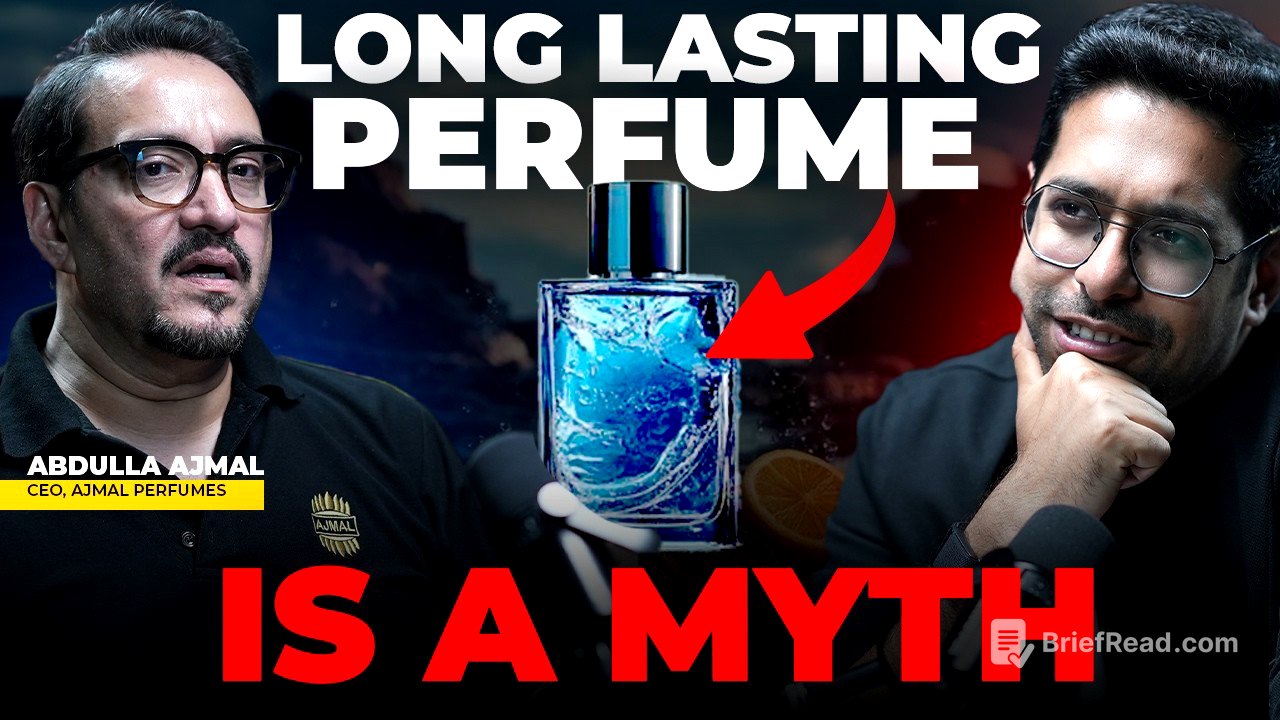TLDR;
This video features an interview with Mr. Abdulla Ajmal, CEO of Ajmal Perfumes, who shares insights into the perfume industry, the history and evolution of his family business, and the challenges and opportunities in the fragrance market. He discusses the longevity and pricing of perfumes, the importance of raw materials, and the brand's global presence.
- Perfume concentration affects longevity.
- Authenticity and brand trust are crucial for online perfume sales.
- Family governance and adapting to new generations are key for business sustainability.
Intro [0:00]
The podcast introduces the concept of uncommon stories behind common things, focusing on the mystery of perfumes. It teases topics such as creating the perfect perfume, choosing the right fragrance, the difference between expensive and affordable perfumes, and the story of how a farmer from Assam built a luxury perfume empire. The discussion features Mr. Abdulla Ajmal, CEO of Ajmal Perfumes, who provides insights into the perfume industry and business secrets.
Longevity [2:15]
The longevity of a perfume depends on its concentration, with higher concentrations generally lasting longer. For example, Eau de Toilette (EDT) has up to 8% oil concentration and lasts 4-6 hours, while Eau de Parfum (EDP) has up to 15% concentration and lasts at least 10 hours. While expensive perfumes may use better raw materials, there is no guarantee they will last longer. Some chemicals, known as boosters, can extend the longevity of inexpensive perfumes, but their quality and effects are questionable. Fragrance choices evolve over time, and brands adapt to new trends.
Fragrances [10:50]
Young people seek experiences and are open to new things, including fragrances. Perfume is becoming a part of daily hygiene rather than just for special occasions. Perfumes communicate messages about the wearer's personality and energy. Gender neutrality in fragrances is increasing, with acceptance of floral scents for men and heavier scents for women.
History [16:14]
India has a rich history of perfumery dating back to Noor Jahan, with traditional practices like oil extraction. However, this knowledge and evolution were not passed down effectively. International brands are now investing in Ayurvedic products, highlighting the importance of reclaiming and evolving traditional practices. Authenticity and knowledge are crucial for brands, and consumers can use resources like Fragrantica and Basenotes to gain information about perfumes.
Proud Moment [26:53]
Mr. Ajmal shares anecdotes of proud moments, including instances where customers recognized and appreciated the authenticity and quality of Ajmal perfumes. He recounts a story of a celebrity status experience in Russia, where customers admired and sought his expertise in layering fragrances. He also mentions instances where his brand was recognized and respected, even by immigration officers.
Ingredients [39:00]
Perfume creation is similar to cooking, with perfumers acting as chefs who create fragrances based on consumer preferences and market trends. Raw materials include oils extracted from various sources like wood, plants, leaves, and roots. The extraction process affects the essence of the raw material. Perfumers sometimes use hypothetical fragrances, such as cherry blossom, which has no natural scent, to create unique and successful perfumes.
Raw Materials [46:11]
Oud is one of the most expensive raw materials used in perfumery, along with Orris and certain types of rose oils. India is famous for Jasmine, especially from South India, but the Jasmon from the south of France is highly valued due to its limited availability. Multiple distillations can be performed to extract new notes and increase the value of raw materials like Patchouli.
Pricing [48:20]
The sweet spot for perfume pricing in India is between ₹1800 to ₹2500, but Ajmal aims to premiumize the brand. The cost of marketing, distribution, and retail also affects perfume prices. Ajmal uses deodorants as an entry point for customers to experience their fragrances. The Indian consumer is gradually moving towards better and higher-priced products.
Family [54:59]
Ajmal's story began with a farmer from Assam who started trading Oud out of necessity. His grandfather's vision and the support of the women in his family were crucial to the business's growth. The company prioritizes sustainability, planting 10 trees for every tree cut and investing in research and development. The third generation faces challenges in transition and succession planning, but family governance and a balance between tradition and innovation are essential for long-term success.
Outro [1:23:07]
The podcast concludes by encouraging viewers to share their thoughts and insights from the discussion in the comments. It also invites suggestions for future guests and topics to be covered in upcoming episodes. The aim is to continue enhancing curiosity and creating connections between knowledge and experiences.




![In chemistry class, the intercom said: “Active threat. This is not a drill.” [FULL STORY]](https://wm-img.halpindev.com/p-briefread_c-10_b-10/urlb/aHR0cDovL2ltZy55b3V0dWJlLmNvbS92aS9Bd3NMVDJOX0FPSS9ocWRlZmF1bHQuanBn.jpg)




